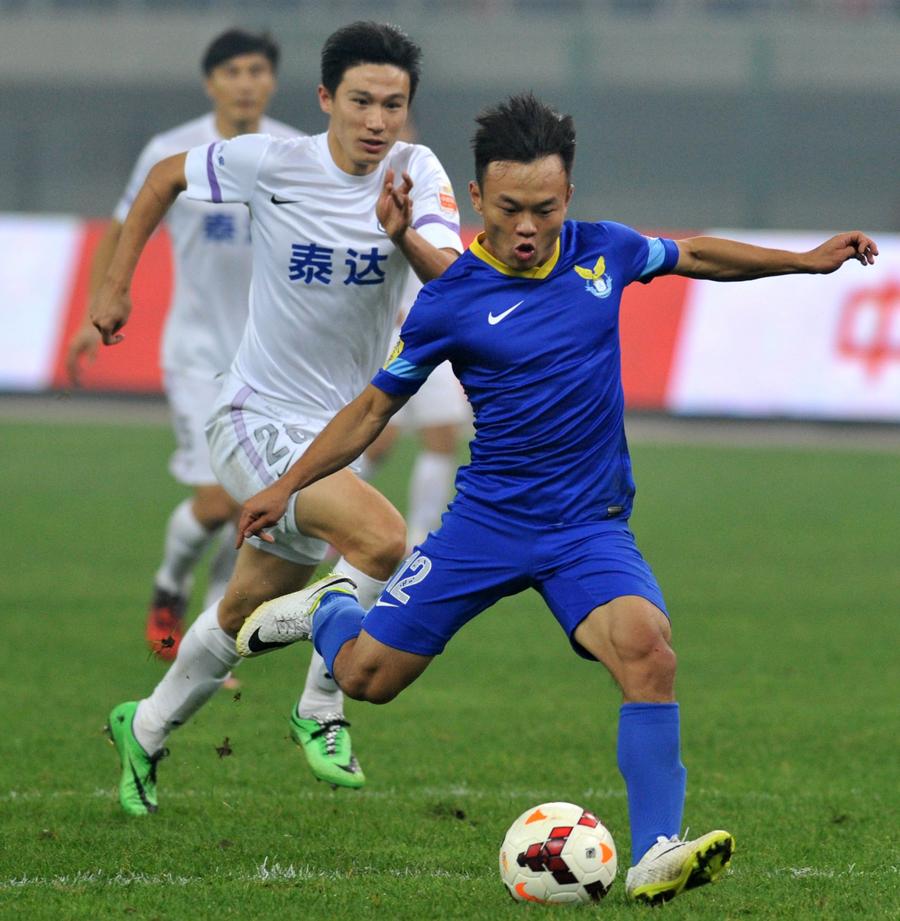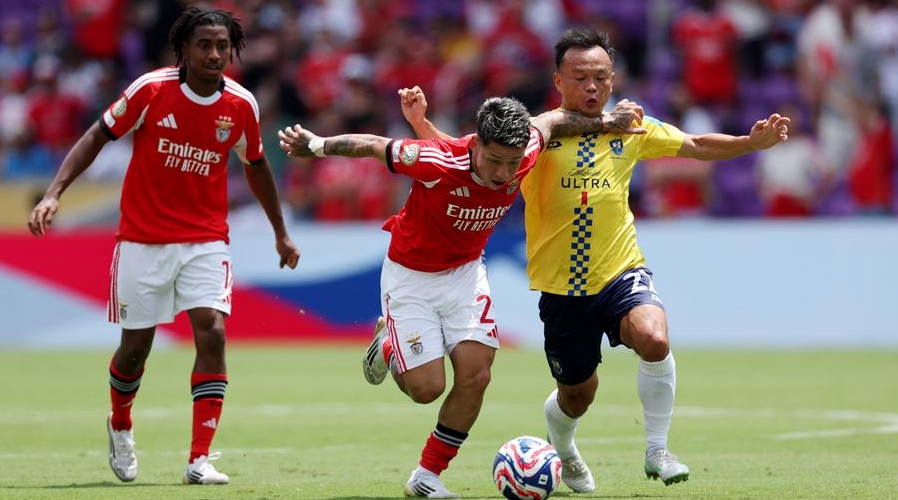The silence in the Auckland City locker room stretched for 24 suffocating hours after its 10-0 defeat to European giant Bayern Munich in its Club World Cup opener.
For veteran Chinese winger Zhou Tong and his semiprofessional teammates, it was not just a loss, but a profound reckoning.
"Although challenging the mighty is an honor, a 10-0 scoreline is a disgrace for any footballer," Zhou said, the weight of the result palpable, even days later. "Privately, we discussed how we could do better, how to give our all against these giants."
Yet, for the 35-year-old, the only Chinese player among the 32 elite clubs in the United States, the burden carries an extra dimension.

Zhou Tong (front) spent five years with Dalian Aerbin from 2009-2014, during which Dalian was promoted to China's top-tier league after winning the championship in second-tier league in 2010. (Xinhua/Zhang Chenlin)
"It's a heavy burden, but first and foremost, it's an honor," Zhou said, reflecting on his unique status representing a nation of billions. "When people talk, it might not be 'Zhou Tong', but 'that player from China', so, every word, every action, every performance on the pitch needs to project positivity. I demand more of myself."
This unexpected chapter, facing Bayern, Benfica and Boca Juniors on soccer's grandest club stage, began not on a manicured pitch, but over coffee in Auckland.
In 2023, Zhou and his family moved to New Zealand, primarily for his wife's studies. Soccer seemed an afterthought until a friend intervened. "He said: 'It's a pity you're not playing.' My form in 2022 was actually quite good," Zhou recalled.
A connection was then made with Auckland City FC. Club president Ivan Vuksich reviewed his CV and requested a meeting. "His sincerity and approachability gave me a lot of motivation," Zhou said. "Plus, Auckland City plays in the Club World Cup. I wanted to keep playing." The deal was sealed in the time it takes to drink a coffee.
Zhou experienced China's "Golden Yuan Soccer Era", when he played for clubs like Dalian Aerbin and Tianjin Jinmen Tiger during a time of explosive, unsustainable spending that temporarily raised the Chinese Super League's (CSL) global profile from the mid-2010s to the early 2020s, but left deep financial and structural problems. For him, New Zealand's regional Northern League was a stark transition.
"The sense of disparity is real," Zhou admitted, contrasting Auckland crowds of "five or six hundred "for crucial Oceania qualifiers with CSL attendances "exceeding 20,000 on average".
Yet, his perspective transformed after he had experienced the extremes: FIFA charter jets for the Club World Cup juxtaposed with bumping along in a "500,000-kilometer-old minibus" on potholed roads to play in Vanuatu, a South Pacific nation where "the tallest building was three stories high, and there were no streetlights".
"Having seen the splendor and the remotest corners of soccer, I realize its power transcends words or money," Zhou reflected, his voice gaining intensity. "Soccer connects people, changes lives, opens eyes to the world. That's its magic, like a universal language."
His understanding fuels his dual role as both a player and community coach for Auckland City, where he's now nurturing the next generation.
"Tong does a wonderful job," Vuksich said. "His nature, his personality is just perfect for that. All the young kids he's involved with, they love him absolutely."
Club general manager Gordon Watson echoed the sentiment, describing Zhou as "charismatic, funny and hardworking", highlighting his calming influence and very positive energy.
"Tong is approachable, friendly, very patient and very understanding. And he has empathy — a lot of empathy — for children," Watson specifically noted Zhou's impact at a coaching clinic at King's College. "He's able to communicate (soccer intelligence) in a way that children and youth players can safely understand."
This focus on youth development aligns perfectly with the club's ambitious plans for its Club World Cup windfall, a guaranteed $3.58 million according to FIFA, plus potential win bonuses. Watson detailed a partnership with Mount Roskill Intermediate School, serving a diverse community with many new immigrants.
"We bring soccer as a tool for holistic development, helping with integration," Watson explained, adding that the prize money will fund an all-weather pitch with floodlights and an admin building.
"When it rains and the field is wet, we cannot train. Children do not come to school," Watson said, outlining the project's profound social goals to improve attendance, channel energy positively and, ultimately, foster better citizens.
"It's got to be long term. Cultural integration happens. We recognize we can play a role," Watson added.
For Zhou, coaching offers fresh perspective and pure joy. "The biggest takeaway for me is that I can view soccer from a different angle," he explained. "The other big one is happiness. Being with kids, 11 or 12 years old, or even eight or nine, they are like blank paper. If they win a match, I'm happier than when I win myself."
He sees soccer's respect embodied even in Bayern's ruthless efficiency. "At 85 minutes, Thomas Muller was shouting at their young players: 'Speed up the tempo! Defensive positioning! Quicker passes! Faster transitions!' They respect soccer, and that means respecting opponents and fans."
Facing giants like Bayern laid bare the gulf between the sides, but Zhou found perspective in the fight itself. "The gap was obvious. We focused heavily on defensive training," he said. "My personal adjustment was to cherish every touch, cherish every attack and defense, treat it like a major exam."
While the 10-0 scoreline initially silenced the squad, Zhou stressed their resolve: "For us, we focus on doing our best in every single play."
His journey, from the pressures of Chinese soccer to family life in Auckland, and now to this global stage, feels surreal.
"Life is truly wondrous and unpredictable," Zhou mused. "Three years ago, I never imagined coming to New Zealand, let alone playing in the Club World Cup. The brave enjoy the world."
Defining his career as unpredictable, hard work and the result of stubbornness, Zhou explained the latter: "If I believe something is right, I persist to the end. If I believe something shouldn't be done, I absolutely won't do it."
This stubbornness also reflects his core: "Pure soccer, and love for it. Whether I become a coach, a club operator, or an event organizer, the essence remains — soccer."


 Share:
Share: 




 京公網(wǎng)安備 11010802027341號
京公網(wǎng)安備 11010802027341號